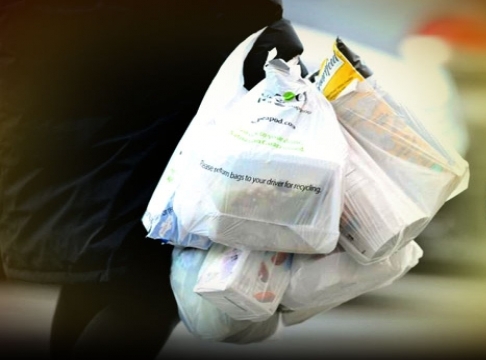Bhubaneswar: The State Government has decided to fight plastics from October 2 that are the non-biodegradable and are threat to the ecological system.
According to a notification issued by Forest and Environment Department Saturday, the Government has decided to restrict the indiscriminate use of certain types of plastic products in the territorial jurisdiction of 5 Municipalities of Bhubaneswar, Cuttack, Berhampur, Rourkela and Sambalpur, and the popular heritage spot Puri.
The directives include:
1: No person, by himself or through another, shall knowingly or otherwise, sell, trade, manufacture, import, store, carry, transport, use or distribute the following items:
(I) Polythene carry bags of any shape, thickness and size (excluding compostable);
(II) Bottled drinking water Polyethylene Terephthalate (PET/PETE) bottles of less than 200 ml capacity;
(III) Single use disposable cutleries made up of thermocol (polystyrene), polyurethane and the like; or plastic such as dish, spoon, cup, plate, glass, fork, bowl, pouch to store liquid and container etc. of any size and shape excepting for packing and selling of milk and other ancillary milk products; and
(IV) Thermocol decorative materials (flowers and the like)
2: The manufacturers or seller of compo-stable plastic carry bags shall obtain a certificate from the Central Pollution Control Board before marketing or selling. Vendors shall not be allowed to use polythene sheets of less than 50 micron thickness for storing, transporting, dispensing or packaging of any article or food items.
This excludes any plastic for carrying and transporting garbage and containers like cup for milk products including curd and icecream etc., polythene packaging materials used in plant nurseries, horticulture, agriculture and healthcare sector like medicines, blood transportation bags, syringe, sample or specimen bags, re-sealable bags, medical instruments and accessories etc. and packing materials used for wrapping of any item at manufacturing stage.
3: No person shall knowingly or otherwise, litter any public place with any plastic item allowed under this Order. The authorities or owners of places of religious worship or institutions, hotels and restaurants, café, mobile food counters or vans, caterers and other such places like marriage or party halls, offices or institutions shall be responsible for ensuring strict compliance of the aforesaid directions.
They shall also provide space for collection of plastic waste within their campus and returning the same to the concerned manufacturer or retailers or supplier.
4: Manufacturers or Producers of Polyethylene Terephthalate (PET/PETE) bottles for bottled drinking water and soft drinks shall take back the bottles and plastic waste respectively through the same retail sales network under mutually agreed terms and conditions based on Extended Producer’s Responsibility.
5: The Municipal Commissioners or the Executive Officers of Urban Local Bodies and other concerned officers or agencies as nominated, shall make wide publicity of all provisions of this Order through Press and electronic media.
The Municipal Commissioner or the Executive Officer shall take adequate steps to implement the restrictions specified under this Order and shall make suitable arrangements for collection and disposal or recycling of any type of plastics item within their jurisdiction.
6: District Collector, Sub-Divisional Magistrate, Member-Secretary of State Pollution Control Board, who are empowered to take cognizance of offence under the Environment (Protection) Act, 1986 shall enforce the provisions of this Order in their respective jurisdiction.
District Collector shall involve Additional District Magistrate, Superintendent of Police, Divisional Forest Officer, Tahasildar, Regional officer of State Pollution Control Board, officers of Municipal Corporation/Municipality and any other officer nominated by him/her, for enforcing the Order.
7: The Cinema Hall owners or proprietors shall exhibit slides in their halls regarding the restriction of plastic use in the State for a period of one year from the date of issue of this Order.
8: The State Pollution Control Board shall ensure closure of the industries producing plastic products which are not confirming to the stipulations of this Order within the 6 above Municipal Corporations/Municipalities.
9: Center for Environmental Studies, Odisha shall make necessary public awareness campaign regarding consequences of indiscriminate use and littering of plastics and restrictions imposed under this Order through Non-Government Organizations and Eco clubs.
10: Any person including the vendor possessing any materials, which are prohibited under this Order, shall dispose of those articles within 1 month from the date of publication of the Order.
Allowed Plastic Items
Plastics for carrying and transporting garbage and containers like cup for milk products including curd and ice-cream, polythene packaging materials used in plant nurseries, horticulture, agriculture and healthcare sector like medicines, blood transportation bags, syringe, sample or specimen bags, re-sealable bags, medical instruments and accessories as well as packing materials used for wrapping of any items at manufacturing stage have been exempted from the restrictions.
On the other hand, littering of plastic items in public places is barred. The authorities or owners of places of religious worship or institution, hotels and restaurants, cafe, mobile food counters or vans, caterers and other such places like marriage or party halls, offices or institutions and the outdoor event managers shall be responsible for ensuring strict compliance of the orders.
Meanwhile, the municipal commissioners of the concerned cities have also been directed to take adequate steps to implement the restrictions and make arrangements for the collection and disposal or recycling of any type of plastic items within one month of the implementation of the ban.
PNN
